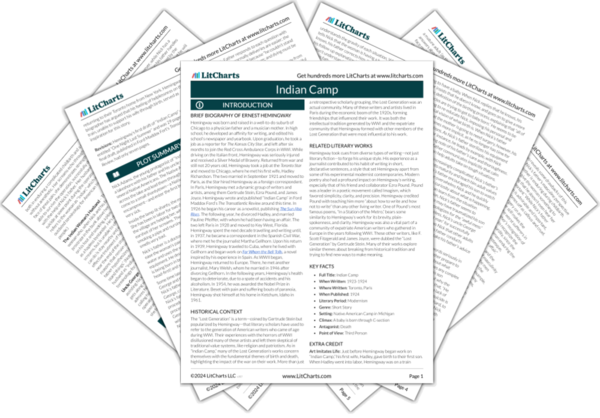Nick’s father and the Indian woman’s husband both use blades in significant ways in the story. When Nick and his father arrive at the shanty, the husband is nursing a bad axe wound on his foot from days prior. Near the end of the story, he kills himself by slitting his own throat with a razor. Meanwhile, Nick’s Father is able to execute a caesarian delivery using a jack knife. Nick’s Father’s superior skill with the knife—a skill that allows him to save both the Indian woman and her baby—emasculates the woman’s husband in comparison. The husband’s use of tools only serves to demonstrate his haplessness. However, Nick’s Father’s use of the jack knife also suggests his callousness—part of his stoically masculine demeanor—as he operates on the Indian woman without any regard for her pain. Although it remains unclear why the husband takes his own life, there are a number of ways to interpret his suicide: it is possible that Hemingway meant to suggest that the intervention of a white doctor (and the performance of a caesarian delivery) was felt to be such a physical and cultural violation that the man took his own life; it is also possible that the husband simply felt ashamed that another man had saved his wife’s life; a third way of interpreting the suicide is that the man could not bear to see his wife in so much pain. In any case, blades become symbolic of the cultural and personal divide that separates Nick’s father from the Indian woman’s husband—whether that divide is about race, masculinity, culture, or sensitivity to the pain of others.
Knives, Axes, and Razor Blades Quotes in Indian Camp
He was feeling exalted and talkative as football players are in the dressing room after a game.
“That’s one for the medical journal, George,” he said. “Doing a Caesarian with a jack-knife and sewing it up with nine-foot, tapered gut leaders.”
Uncle George was standing against the wall, looking at his arm.
“Oh, you’re a great man, all right,” he said.
“Ought to have a look at the proud father. They’re usually the worst suffers in these little affairs,” the doctor said. “I must say he took it all pretty quietly.”[…]
The Indian lay with his face toward the wall. His throat had been cut from ear to ear.












